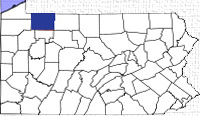THIS command, of which Major Darius Titus, of Warren county, was one
of its original officers, was organized near Philadelphia late in the autumn
of 1861. It remained there until about the 1st of May, 1862, when it was
ordered to Washington, D. C, where it received arms. On the 20th of June
it was ordered to Manassas Junction, and was employed in guarding the
Orange and Alexandria Railroad. It was past the middle of July, however,
before the command was mounted, and little progress had been made in training
and discipline before active operations commenced.
At midday of the 26th of August Colonel Pierce received a telegram from
General Sturgis, at Alexandria, acting under the direction of General Pope,
then in command of the Union forces in Northern Virginia, directing him to
proceed to White Plains and ascertain the strength and position of the enemy
in that locality. Colonel Pierce, who was in a feeble state of health, and in
the absence of Lieutenant-Colonel Kohler, placed the regiment under command
of Major Titus. The regiment was scattered along the road, a distance
of twelve miles, on guard, and it was six o'clock before the forces could be assembled
and in readiness to start. Darkness soon came on, and, being without
reliable guides, and having a distance of twenty miles to traverse in an enemy's
country, some difficulty was experienced in keeping the direct route. One
company was left at Pope's Run, and a battery of two pieces at Manassas. In
the neighborhood of Gainesville a rebel picket was captured, who disclosed the
fact that half the rebel army was in its immediate front, "Stonewall" Jackson
having turned the right of Pope's army. Soon firing was heard at Manassas,
and a great light showed but too plainly that the enemy was already in possession.
Without stopping for rest the column retired towards Bristoe; but
as it approached the town found it already occupied by Jackson, with his artillery
and infantry in commanding positions. To escape the enemy's clutches
seemed impossible; but, determined to cut his way through or sell his command
at severe rebel cost, Major Titus turned towards Manassas. Discovering
his designs the enemy opened with his artillery and infantry, and closing in
upon it inflicted a loss of two hundred and sixty in killed, wounded, and prisoners—
Major Titus being among the latter.
The command now devolved on Major Congdon, who withdrew his shattered
column to Centreville. He was immediately ordered to retire to Alexandria,
where he reported to General McClellan in person, giving the first
reliable intelligence of the presence of Jackson at Manassas. On the following
day the regiment was ordered to cross the Potomac, and patrol and picket the
left bank of the river from the Chain Bridge to Edward's Ferry, in which duty
it continued until the enemy crossed above, to enter upon the Antietam campaign.
During the battle of Antietam, the command rendered efficient service in
watching the enemy's movements upon our flanks and in bringing up stragglers
and checking disorder. Subsequently it participated in the raid on Moorefield,
the expedition to Woodstock, and a hot encounter at Fisher's Hill. When
Lee so stealthily left his camps on the Rapidan, and began his march into
Pennsylvania in June, 1863, the Twelfth was the first to discover the movement,
though the facts as reported by the commander of the regiment were at
first discredited. This delusion was soon dissipated, however, and the correctness
of the report made apparent, by the advance of the whole of Lee's army
on all the roads leading from the south. As Lee continued to advance down
the valley, General Milroy, in command of the Union forces, posted his small
army in an advantageous position, at Winchester, Va., and for three days held
the entire rebel army in check with a force of less than twelve thousand men.
The enemy refused to assault, but gradually gathered in around the town, until
nearly every way of escape was cut off. At a council of war, held on the night
of Sunday, June 14, it was decided that an attempt should be made by the
command to cut its way out, and push for the Potomac. Under cover of darkness
the brigade moved out a little after midnight, in the order of their numbers.
Four miles out, on the Martinsburg road, the enemy was encountered
in strong force, and a heavy night engagement took place, in which the Twelfth
participated, sustaining considerable loss. Lieutenant-Colonel Moss, in command
of the regiment, had his horse shot under him, and was severely injured
by the fall, the command then devolving on Major Titus. (1.) Taking advantage
of the noise of the contest, Milroy's troops separated into two columns, to their
mutual advantage, one moving towards Harper's Ferry, the other, by way of
Bath and Hancock, to Bloody Run. The Twelfth was with the latter.
(1.) Major Titus was honorably discharged April 25, 1864.
At the close of the Gettysburg campaign the Twelfth marched to Sharpsburg,
Md., where it remained until August 3. It then moved to the vicinity
of Martinsburg, Va., where it performed scouting and picket duty until the
opening of the campaign in May, 1864. Meanwhile many of the men had reenlisted,
and its ranks were otherwise strengthened by recruits. When the
rebel Early made his demonstration on Washington in the summer of 1864,
he was, in his advance and retreat, opposed and harassed at every step by the
Union cavalry under General Averell. The Twelfth was a conspicuous organization
in this command, and it rode in the thickest of the fray at Solomon's
Gap, Pleasant Valley, Crampton's Gap, Winchester, and Kernstown. Upon
the accession of General Sheridan to the chief command of the army in the
Shenandoah Valley, the regiment was assigned to General Torbert's Division.
Under that general it participated in many other minor actions in the same
valley, which continued to afford an ample field for hostile demonstrations
until the close of the war. Its last battle was fought at Hamilton, Va., March
22, 1865, where it sustained a loss of six killed and nineteen wounded. It
was mustered out of service at Winchester, Va., July 20, and and returned in
a body to Philadelphia.
The Warren county men in this regiment served chiefly in Company K,
whose members were accounted for at muster out as follows:
COMPANY K.
Captain Nathaniel Payne, discharged April 21, 1865, expiration of term.
First Lieutenant Addison R. Titus, discharged April 3, 1865, expiration of
term.
First Lieutenant Harvey Russell, mustered out with company; veteran.
Second Lieutenant Deloss Chase, killed at Hamilton, Va., March 22, 1865.
Second Lieutenant Stephen B. Sterrett, mustered out with company; veteran.
First Sergeant John Thomas, mustered out with company; veteran.
Quartermaster-Sergeant George H. Sill, absent on detailed service at muster out; veteran.
Sergeant William G. Lambertson, mustered out with company; veteran.
Sergeant Coryell Douglass, mustered out with company; veteran.
Sergeant Charles T. Widdifield, mustered out with company; veteran.
Sergeant George H. Hollman, mustered out with company; veteran.
Sergeant Andrew J. Burns, mustered out with company; veteran.
Sergeant Nathaniel Siggins, discharged April 25, 1865, expiration of term.
Corporal Andy Daum, discharged by general order June 3, 1865; veteran.
Corporal Thomas Nelson, mustered out with company; veteran.
Corporal Augustus L. Selden, mustered out with company; veteran.
Corporal John H. Siggins, mustered out with company; veteran.
Corporal Darius M. Ford, mustered out with company; veteran.
Corporal Merrill D. Morley, mustered out with company; veteran.
Corporal John H. Green, discharged on surgeon's certificate June 5, 1865.
Blacksmith Isaac Douglass, mustered out with company; veteran.
Farrier Erastus Mead, mustered out with company; veteran.
Saddler George F. Green, mustered out with company.
Privates.
John Anderson, mustered out with company.
Riley Averill, mustered out with company.
George W. Arters, mustered out with company.
John A. Aikens, mustered out with company; veteran.
William A. Beddow, mustered out with company; veteran.
Charles F. Black, mustered out with company.
John Black, mustered out with company.
John D. Beebe, mustered out with company; veteran.
Jared L. Barton, mustered out with company; veteran.
Perry L. Barton, mustered out with company.
William F. Burdick, mustered out with company.
Adam Bonn, discharged April 25, 1865, expiration of term.
Thomas Bohn, died of wounds received at Charlestown, Va., February 7,
1865.
Samuel Burris, discharged by general order June 1, 1865.
George W. Briggs, discharged December 6, 1865; veteran.
James Brogan, discharged by general order November 18, 1865; veteran.
Charles Covell, mustered out with company; veteran.
John Cook, mustered out with company.
James E. Clark, mustered out with company.
James Carroll, absent, sick, at muster out.
Peter Conway, discharged on surgeon's certificate January 20, 1865.
William Cosgrove, discharged April 21, 1865, expiration of term.
William H. Clark, discharged by general order June 1, 1865.
Luther Carpenter, discharged, date unknown.
John Davis, mustered out with company.
Frederick Deiter, mustered out with company.
Chauncey Dunbar, discharged by general order June 22, 1865.
Andrew Diven, discharged by general order June 1, 1865.
Albert E. Ellsworth, discharged April 1, 1865, expiration of term.
Nathaniel C. Enos, killed at Hamilton, Va., March 22, 1865; veteran.
Jacob Frey, discharged by general order June 1, 1865.
Abraham Garlick, mustered out with company.
John C. Griffin, discharged by general order June 1, 1865.
William J. Griffin, discharged by general order June I, 1865.
Adam Garlick, discharged by general order November 24, 1865.
Michael Heintz, mustered out with company.
Robert W. Hudson, discharged by general order March 7, 1865.
Alfred S. Hatfield, died April 3, 1865.
Martin Illtis, mustered out with company.
George W. Irvine, discharged April 21, 1865, expiration of term.
Augustus Jones, mustered out with company; veteran.
William Johnson, discharged by general order June 1, 1865.
Samuel Jones, discharged on surgeon's certificate August 26, 1862.
Frederick Knapp, mustered out with company.
Alanson Kibly, absent, sick, at muster out.
Henry C. Keefer, discharged by general order June 1, 1865.
Jason Libby, mustered out with company.
James Lesh, mustered out with company; veteran.
John Lindsey, discharged by general order June 1, 1865.
Monroe Martin, transferred to Company B, date unknown; veteran,
William McGinty, discharged by general order March 29, 1865.
Alex. McLaughlin, mustered out with company.
Archibald McDonald, mustered out with company.
William McAuley, discharged on surgeon's certificate May 26, 1865;
veteran.
Charles McCallen, died at Sandy Hook, Md., June 29, 1864.
James McAfee, killed at Hamilton, Va., March 22, 1865.
Jacob Nyheart, mustered out with company.
George H. Nobbs, discharged by general order September 11, 1865;
veteran.
Patrick O'Harra, mustered out with company; veteran.
Hiram Parrish, mustered out with company.
Henry Rupp, mustered out with company.
James H. Randall, died, date unknown; buried at Antietam,
Joseph S. Rogers, died August 22, 1862.
Jacob Showalter, mustered out with company.
William Simpson, mustered out with company.
James B. Smith, mustered out with company.
James Smith, mustered out with company.
Jacob Strausbury, mustered out with company.
John W. Slonaker, discharged by general order June I, 1865.
George Vanguilder, mustered out with company.
William Watt, mustered out with company.
Jacob Weist, discharged by general order June 1, 1865.
Thomas L. Young, absent, sick, at muster out.
|




